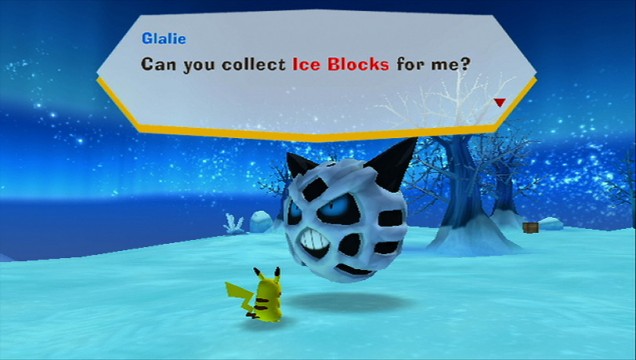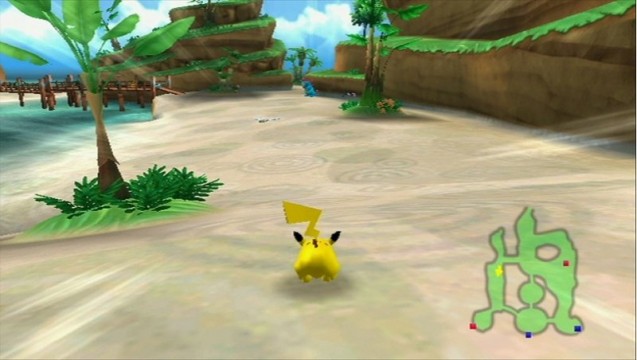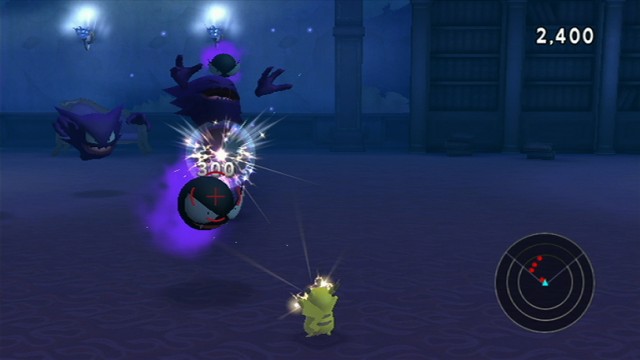Real-time battles, charming atmosphere
Repetitive challenges, limited controls, lack of multiplayer
PokéPark Wii is something of an anachronism. At a cursory glance, the title seems like it was ripped straight out of a bygone generation, the kind of Pokémon spin-off that would have felt more at home on Nintendo 64 than on a modern-day game console. That is not to say that the title is archaic; rather, it shares a number of similarities with the Pokémon spin-offs of that time, and it is clear the game would have been among kin had it been released alongside the likes of Pokémon Snap and Hey You, Pikachu! Also of importance around this time was the American premiere of Mewtwo Strikes Back, and fans old enough to remember the event will note that PokéPark Wii bears more than a passing resemblance to “Pikachu’s Vacation,” the animated short that preceded the film. It is for these reasons that the game feels chronologically displaced, a modern title that is simultaneously removed from and entrenched in the past. All of this history will undoubtedly be lost on younger fans of the series, but it will be enough to elicit an emotional response from those who grew up with the franchise, transforming a solid little adventure into a nostalgic experience that is greater than the sum of its parts.
Given the title’s younger target demographic, the plot of PokéPark Wii is expectedly simple: the Sky Prism, a celestial jewel that maintains the stability of the PokéPark, has inexplicably shattered, throwing the entire reserve into disarray. Without the prism, the Sky Pavilion, the heavenly sanctuary in which it is housed, will fall from the ether and destroy the park. Pikachu is charged with restoring order to the land, and to do so he must travel between the individual sections of the park (called “Zones”) and recover the missing shards of the prism.
Controls are handled entirely by the Wii Remote, held in a horizontal position. The D-pad controls Pikachu’s movement, while dashes and jumps are performed by the 1 and 2 buttons, respectively. The A button allows Pikachu to charge and release a Thunderbolt, and a shake of the remote unleashes a swift Iron Tail (though only while engaged in battle). The control scheme is needlessly limited and cumbersome as a result— digital movement is rarely precise in a three-dimensional space, and controlling Pikachu (especially while running) feels awkward at best and frustrating at worst. Nunchuck support would have easily remedied these shortcomings, but it was curiously forgone (presumably in the name of simplicity). To the game’s credit, its objectives are rarely difficult enough for the controls to impede one’s success, but they still require a period of adjustment and will undoubtedly be a turn off for some.
Despite being billed as an adventure game, exploration in PokéPark Wii is little more than a means of stringing together the title’s myriad challenges. The locales of the park can be sparse, but they are filled with an undeniable charm that brings them to life. The graphics, while not the most technically impressive on Wii, are actually very nice, and some of the later Zones in particular are really quite stunning in their art direction— the Iceberg Zone, for instance, is set beneath the ethereal glow of an eternal aurora, while the Granite Zone subtly recalls the Arbiter’s Grounds from The Legend of Zelda: Twilight Princess. Music, likewise, is simple but pleasant, and each theme compliments the feel of the area it represents.

The challenges themselves are generally enjoyable, if a bit repetitive. They are divided into two categories: Skill Games and Attractions. The former are simple competitions against individual Pokémon, and they range from schoolyard games like Chase (tag) and Hide-and-Seek to actual battles; the latter are fuller mini-games, many of which would not seem out of place in a Mario Party title. Each Attraction incorporates gesture controls to varying degrees of success, though they are, for the most part, fairly intuitive and should present no major problems for the player. Successful completion of Attractions awards you Prism Pieces and Berries (currency), while the Pokémon you best in Skill Games are added to your friends list, essentially “unlocked” for use in the Attractions.
Outside of improving your own score, there is little incentive to replay an Attraction after its initial completion. A multiplayer mode would have greatly extended the title’s longevity– each mini-game is perfectly suited for competitive play against friends, and the title could have become a party staple had the option been included. Fun as they may be, none of the Attractions are compelling enough on their own to inspire repeated plays, and the lack of multiplayer support really hurts the overall package.

Skill Games are generally longer-lived, due in part to their immediate visceral satisfaction. Battles in particular are among the most fun of all the game’s challenges. Unlike traditional Pokémon titles, combat in PokéPark Wii occurs in real-time and is much more energetic as a result. Using the three attacks at your disposal, you must defeat your opponent within a set time limit to earn their friendship. Most can be beaten quite easily, but the sheer joy of battling will encourage you to challenge the same opponent multiple times.
There is also a surprising degree of interactivity during battles– not only can you knock your opponent into nearby bodies of water (with the right positioning and a little luck), but other Pokémon can also interfere in your sparring matches. During my battle with Ambipom, for example, a nearby Mankey inadvertently stepped between the two of us and took the full brunt of my Thunderbolt for his troubles. As the battle progressed, he exacted revenge upon me with a tackle from behind, and I quickly found myself outnumbered 2-to-1. Such scenarios are oftentimes unavoidable, and while they do not significantly affect the difficulty of the battles, they contribute immensely to their fun. These situations can even be advantageous: later areas are rife with Pokémon to be exploited, and you’ll find yourself ducking behind any unsuspecting creatures you can, using them as meat shields against projectile attacks.
This level of interactivity extends outside of battles as well, as any Pokémon within the game can be attacked without consequence. More often than not the temptation is far too great to resist, and if you found some mischievous pleasure in pelting the innocent creatures with Pester Balls in Pokémon Snap, you will absolutely revel in the ability to Thunderbolt any of them you please. There is some perverse satisfaction in watching the Pokémon humorously fall over after being pumped full of electricity, and the game almost seems to encourage this behavior by depicting the Pokémon as enjoying battles, absolving you of any guilt you may feel over harming these adorable creatures.

Like its contemporary Kirby’s Epic Yarn, PokéPark Wii is a very forgiving title. There is no punishment for failure– Pikachu has no lives to lose, and any challenge can be immediately replayed with no detriment to your progress. This would normally be a strike against any game, but like Kirby, PokéPark Wii exudes a very relaxing atmosphere, and the lack of difficulty only serves to accentuate this feel. Those looking for a difficult quest fall outside of PokéPark Wii‘s target demographic anyway, making the game’s ease a nonissue.
For what it is, PokéPark Wii is an endearing little game that is sure to incite nostalgia in longtime fans of the series. The title succeeds most as an introductory adventure for children, but those who enjoyed any of the early Pokémon spin-offs on Nintendo 64 are likely to enjoy this one as well. It may not be a challenging or lengthy quest, but it is very much a pleasant one, and at the end of the day that is really enough to recommend the game to those curious about it.




 ShareThis
ShareThis






haha. i kind of want to play it now. great review! :D
lol glalie..creepy floating face.